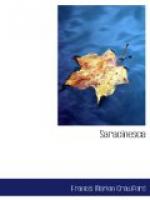Donna Tullia, who was not in the least artistic, and who by no means appreciated the merits of the portrait Gouache was painting, was very far from comprehending his definition of artistic comparison; but Del Ferice understood it very well. Donna Tullia had much foreign blood in her veins, like most of her class; but Del Ferice’s obscure descent was in all probability purely Italian, and he had inherited the common instinct in matters of art which is a part of the Italian birthright. He had recognised Gouache’s wonderful talent, and had first brought Donna Tullia to his studio—a matter of little difficulty when she had learned that the young artist had already a reputation. It pleased her to fancy that by telling him to paint her portrait she might pose as his patroness, and hereafter reap the reputation of having influenced his career. For fashion, and the desire to be the representative of fashion, led Donna Tullia hither and thither as a lapdog is led by a string; and there is nothing more in the fashion than to patronise a fashionable portrait-painter.
But after Anastase Gouache had thus delivered himself of his views upon Del Ferice and the faculty of artistic comparison, the conversation languished, and Donna Tullia grew restless. “She had sat enough,” she said; and as her expression was not favourable to the portrait, Anastase did not contradict her, but presently suffered her to depart in peace with her devoted adorer at her heels. And when they were gone, Anastase lighted a cigarette, and took a piece of charcoal and sketched a caricature of Donna Tullia in a liberty cap, in a fine theatrical attitude, invoking the aid of Del Ferice, who appeared as the Angel of Death, with the guillotine in the background. Having put the finishing touches to this work of art, Anastase locked his studio and went to breakfast, humming an air from the “Belle Helene.”
CHAPTER VIII.
When Corona reached home she went to her own small boudoir, with the intention of remaining there for an hour if she could do so without being disturbed. There was a prospect of this; for on inquiry she ascertained that her husband was not yet dressed, and his dressing took a very long time. He had a cosmopolitan valet, who alone of living men understood the art of fitting the artificial and the natural Astrardente together. Corona believed this man to be an accomplished scoundrel; but she never had any proof that he was anything worse than a very clever servant, thoroughly unscrupulous where his master’s interests or his own were concerned. The old Duca believed in him sincerely and trusted him alone, feeling that since he could never be a hero in his valet’s eyes, he might as well take advantage of that misfortune in order to gain a confident.
Corona found three or four letters upon her table, and sat down to read them, letting her fur mantle drop to the floor, and putting her small feet out towards the fire, for the pavement of the church had been cold.




